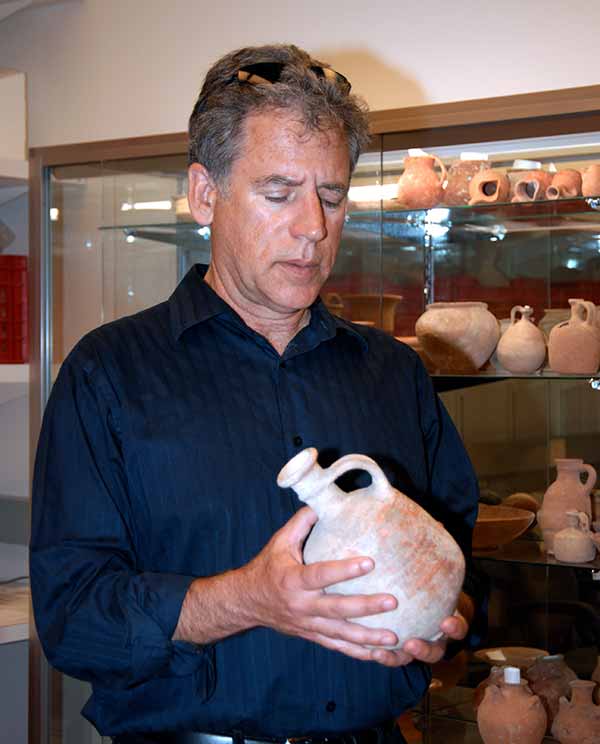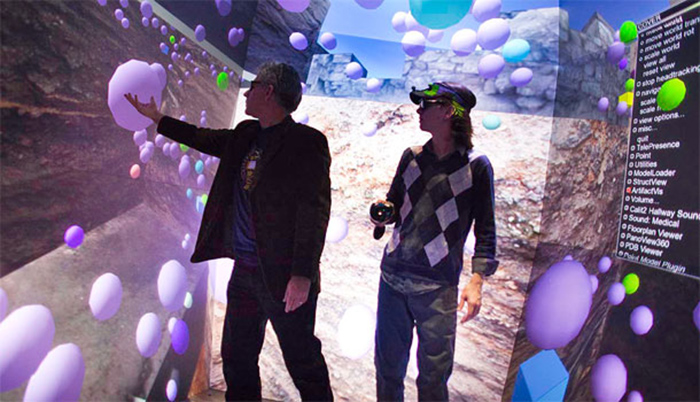UC San Diego’s Thomas E. Levy Among Recipients of President’s Research Catalyst Award
Published Date
By:
- Tiffany Fox
Share This:
Article Content
University of California President Janet Napolitano has announced the recipients of the 2016 President’s Research Catalyst Awards, chosen from a pool of more than 180 proposed projects. Qualcomm Institute affiliate Thomas E. Levy of the UC San Diego Department of Anthropology is one of the recipients of the award.

UC San Diego Prof. Thomas E. Levy is the receipient of a President's Research Catalyst Award.
The four awards, totaling more than $4.8 million, will involve faculty and students from nearly every UC campus. The selected research projects focus on protecting biodiversity; enhancing agricultural resilience in times of drought; the detection of dark matter; and preserving cultural heritage sites in the Middle East.
"Some of the most important research happening today is interdisciplinary and collaborative," Napolitano said. "With these awards we are creating new opportunities for those kinds of productive partnerships while furthering research that ranges from archeology to particle physics."
Levy's $1.07 million project will leverage the recently-announced Pacific Research Platform — a 10-100Gb/s networking platform led by UC San Diego and UC Berkeley — to curate, analyze and visualize 3D data from at-risk archaeological sites in Egypt, Turkey, Jordan, Israel, Greece, Morocco and Cyprus.
The work, which is being done in collaboration with archaeology faculty at UC Berkeley (Benjamin Porter), UC Merced (Nicola Lercari) and UCLA (Willeke Wendrich), incorporates more than 10,000 years of cultural materials, architecture and landscapes. It includes site and artifact identification, cataloging, and digital preservation of complex data and other content derived from satellite imagery, drones, sensors, 3D data capture, and other techniques. The platform is expected to enable correlative studies of regional climate/environmental data and demographic, cultural, and technological changes, as well as the creation of 3D models using new kinds of geospatial data. It will also enable studies of how human conflicts, climate change, pollution, natural disasters, and looting affect archaeological sites and forecasting of critically-endangered places.

Thomas E. Levy (at left) interacts with 3D archaeological data in the Qualcomm Institute StarCAVE
Levy's proposal includes walk-in life-sized 3D kiosks and personal devices for viewing digital objects and sharing heritage data at each campus. The devices will also be networked for telepresence collaboration in 3D. Public engagement in the UC research mission will be promoted via online crowd-sourcing to monitor at-risk sites, and open-source software will enable public access to 3D digital heritage visualization.
"The project will position UC as a national leader in global cultural heritage preservation efforts, and California as an active participant in ‘archaeo-diplomacy’ by offering solutions for virtual documentation of at-risk cultural resources," said Levy. It will also be one of the signature projects for the newly created Center for Cyber-Archaeology and Sustainability at the Qualcomm Institute.
Napolitano launched the President's Research Catalyst Awards in December 2014. The program channels $10 million over three years to fund research in areas of strategic importance, such as sustainability and climate, equity and social justice, health care, and basic discovery. To qualify, projects must be multi-campus, multi-disciplinary efforts that offer research, teaching and learning opportunities for undergraduate and graduate students. This year, applicants were also asked to incorporate public engagement and faculty mentorship components into the projects.
This year's recipients were selected following a highly competitive review process. A panel of experts evaluated applications and recommended ten finalists to the president. Napolitano then selected four projects that represent a broad scope of disciplinary and topical diversity and will be of benefit to California and the world.
The other award recipients are:
- Preservation of Biodiversity through Conservation Genomics: Led by Robert Wayne, UCLA, $1.76 million. A network of 5 UC campuses will develop a revolutionary bioinformatics toolkit to understand changes in gene expression and how threatened populations respond to changes in their habitats and in the climate. The collaboration will involve undergraduate students and the public in a DNA-based biodiversity survey across California.
- California Drought and Carbon Management for Agriculture: Led by Samantha Ying, UC Riverside, $1.69 million. California agriculture, a backbone of the state’s economy, faces enormous challenges as access to a predictable water supply declines. Cutting-edge research in the soil microbiome holds promise for understanding soil-carbon dynamics. A collaboration of four UC campuses, Lawrence Berkeley National Lab and several Agricultural Research and Extension Centers will estimate how crops like tomatoes and alfalfa respond to drought using varying farming practices and irrigation methods.
- Sensors for Detecting Dark Matter: Led by Holger Müller, UC Berkeley, $300,000. Dark matter makes up most matter in the universe, but the particles that comprise it remain undetected. Using data collected at three UC campuses, this project will use sensitive probes to search for ultra-light subatomic particles believed to constitute dark matter, potentially revealing clues that will identify the basic building blocks of the universe.
UC faculty will be invited to apply for the third round of the President’s Research Catalyst Awards funding, with an RFP process beginning in spring 2016. More details will be posted here.
The awards are funded through an existing president’s fund used to support systemwide initiatives.
Share This:
You May Also Like
Stay in the Know
Keep up with all the latest from UC San Diego. Subscribe to the newsletter today.



